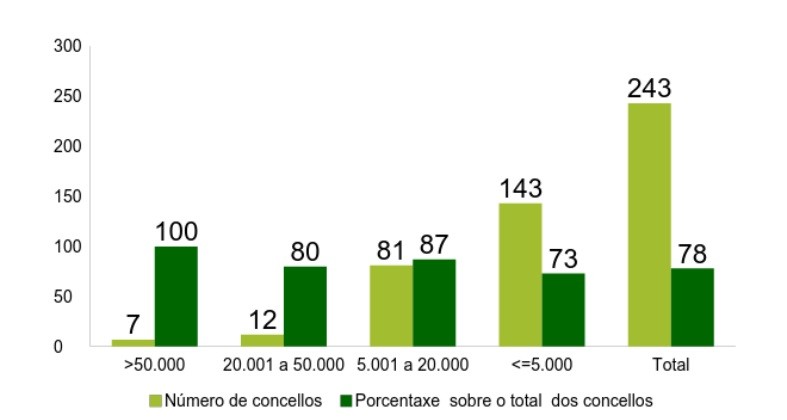Since 2015, Spanish municipalities have been obliged (all of them) by the Law 19/2013 of Transparency, Access to Public Information and Good Government, to comply with a wide set of legal obligations. That does not mean that the City Councils are necessarily more transparent. Because laws do not work miracles. And they do not do it because it takes much more than the BOE to introduce real changes in the DNA of an Administration that numantinely resists the transformation.

To start with, because at the local level there are particular characteristics that have a great impact on their ability to fulfil the new duties. The starting conditions already allow us to venture the main difficulties to implement transparency in the municipalities, as most of them converge in a single problem: the local council workers. It is common knowledge that the hyper-fragmentation of the local map, with more than 8,100 municipalities, of which almost 84% have less than 5,000 inhabitants. The small dimensions of which leads to the logical scarcity of means, personal, material and technology. Particularly worrying in the latter case, given the extent and depth of the digital divide and the link between transparency and e-government.
Why is transparency important? Because it represents an open window, through which the general public can observe the detail of municipal management, analyze it and reach their own conclusions. Thanks to the fact that they can access the data of economic management, budgets, subsidies, contracts, but also those related to their political leaders and the functioning of the governing bodies. Data that has to be available, by law and without having to specifically request it, through electronic means.
Transparency is the right to know
Guaranteeing a greater accessibility by electronic means that allows its consultation by the general public without regard to how far away they are. From their home, from another municipality, from another Regional Government and even from another country. In a single click. Because transparency not only allows access to information by those registered in that particular municipality, but to anyone, regardless of their condition. That is to say, the lack of transparency and lack of information affects all the general public, the media and also civil society organisations.
Transparency is important because it represents an open window, through which the general public can observe the detail of municipal management, analyze it and reach their own conclusions
Transparency is not only the information that the council wants to publish, it is also information that the general public wants to know. It is the right to know. Although there is still a long way to go in this area and we need to raise the general public' awareness of the new dynamics. To empower them as active subjects in the management of public affairs. That accountability does not occur only every four years through the ballot box, but every day. However, according to data from the Transparency Portal of the State we still ask little, given the use of information already published. There is a clear reflection of this in the data. As of December 31st, 2016, there had been more than six million visits (6,444,615) to the transparency portal compared to only 7,087 requests for access to information. Lack of knowledge, administrative (that is to say, bureaucratic), technological or distrust difficulties, the reasons are many and varied, but we need to change the trend.
Not forgetting that when we talk about transparency, we also talk about corruption. Because of the suspicions of corruption, the numerous court cases open and the impact on the general public because of their proximity, city councils are frequently overrun, social alarm multiplies and justifies the concern. In this sense, transparency operates at two levels, not only as a tool to fight against corruption, but also as a tool to prevent corruption. As a well-known quote points out when speaking of transparency "The more I observe you, the better you behave" (Jeremy Bethan).
Now that we have analyzed the starting point, now we need to propose measures that help to improve the effectiveness of a right with a broad legal recognition and avoid a vacuum that transforms it in merely testimonial and residual. The non-existent system of penalties for those who fail to comply with their transparency obligations requires the use of positive reinforcement measures that contribute to the development of a culture of transparency beyond mere posting of data on a website: there should be well-articulated measures on previously diagnosed causes.
Align strategies to rationalize resources
First, the control. Regarding control systems, and apart from the State Transparency Council and other autonomous figures, some municipalities have also opted for the development of their own systems, such as the Provincial Council of Gipuzkoa Institutional Integrity System, with a Code of Conduct and Good Practices and that takes care of the control work with an Institutional Ethics Commission, the Citizen's Council for the Transparency of Vitoria and other formulas such as the Anti-Fraud and Corruption Office of the City of Madrid. Control that has to carry a sanctioning capacity, especially in a country such as ours, in which, without sanction, it seems that there is no obligation.
Transparency operates at two levels, not only as a tool to fight against corruption, but also as a tool to prevent corruption
Secondly, as we said, to improve, we need to take into account the peculiarities of the local government world. We need to devise concrete solutions for some entities with particular characteristics. Given that, speaking of municipalities, size determines the results, because the difference is observed, above all, in terms of population, number of inhabitants. Therefore, and beyond the publication or not of certain information in the Transparency Portals, we need to go a step further and work towards the achievement of concrete progress. We need to align strategies to rationalize personal, material and technological resources in the case of smaller municipalities, through the use of joint formulas. In this way, we will continue to move towards better local public management, towards a better public service.
In Galicia, a recent study by Red Localis on the status of the Transparency Portals of the Community councils, carried out from the University of Vigo in collaboration with FEGAMP and the Xunta de Galicia, proves this. The report concludes that 78% of Galician municipalities have Portal de Transparencia, that is, 243 of the 313 that currently exist. Conversely, 22% do not even have this tool, a total of 70 municipalities. Analyzing in more detail, we observe that it is precisely in the band of less than 5,000 inhabitants of the Galician municipalities in which 59 of the 70 that do not have a transparency portal are located, as is clear from the graph.
"Distribution of Galician municipalities that has a portal of transparency by population size"

Source: Red Localis (Report on the status of the Municipal Transparency Portals of Galicia). University of Vigo, Xunta de Galicia and FEGAMP
We have to go further than merely comply with the law
That is, the level of compliance decreases with town population. A situation that is repeated in relation to the updating of the information and its accessibility. Basically, in order for the information to fulfil its purpose of facilitating a real knowledge of public management, we need that the information be useful and allow an effective accountability, that it is updated, structured, clear and accessible information, to be comprehensible by anyone, not just by knowledgeable administration experts.
Thirdly, we have to go further than merely comply with the law. We need to work on the implementation of a true culture of transparency and for this the local scope is ideal, because of its proximity to the general public, as being those closest to the administration, is configured as the stage in which to move towards open government, towards a new management model based on public policies of innovation, transparency and good governance.
In short, answering the initial question: is there transparency in the Spanish town councils? Yes, but it can and should be improved. Something has gone wrong when practically 50% of the general public are unaware of the law and 70% of the control bodies. Something has gone wrong when transparency in public management depends solely on the will of the administration responsible. In the municipal case, of more than eight thousand municipalities. We should not forget that a right empty that is of content is a right that does not exist. Therefore it is to ensure the right to transparency, in truth, (not to "trick-sparency") in each and every one of the municipalities.










